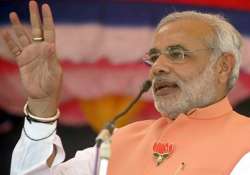Modi govt's failure to protect people figures in US report
New Delhi, Apr 22: India's civil society continues to express concern over the Gujarat Government's failure to protect people or arrest those responsible for communal violence in 2002, a US report on human rights has

New Delhi, Apr 22: India's civil society continues to express concern over the Gujarat Government's failure to protect people or arrest those responsible for communal violence in 2002, a US report on human rights has said.
The report, titled 'Country Reports on Human Rights Practices for 2012' released by the US State Department, as mandated by the Congress, says human rights groups continue to allege that investigative bodies in their reports showed bias in favour of Gujarat's Chief Minister Narendra Modi.
"Civil society activists continued to express concern about the Gujarat government's failure to protect the population or arrest those responsible for communal violence in 2002 that resulted in the killing of more than 1,200 persons, the majority of whom were Muslim, although there was progress in several court cases," said the report, which was released by US Secretary of State John Kerry on Friday.
"Human rights groups continue to allege that investigative bodies showed bias in favour of Modi in their reports," the US report said.
The chapter on India in the report runs into 60 pages, according to which the most significant human rights problems in India in 2012 were police and security force abuses, including extra-judicial killings, torture, and rape; widespread corruption at all levels of government, leading to denial of justice; and separatist, insurgent, and societal violence.
"Other human rights problems included disappearances, poor prison conditions that were frequently life-threatening, arbitrary arrest and detention, and lengthy pretrial detention. The judiciary was overburdened, and court backlogs led to lengthy delays or the denial of justice," the report said.
"Authorities continued to infringe on citizens' privacy rights," it said.
"Separatist insurgents and terrorists in Jammu and Kashmir, the Northeastern states, and the Naxalite belt committed numerous serious abuses, including killing armed forces personnel, police, government officials, and civilians. Insurgents were responsible for numerous cases of kidnapping, torture, rape, and extortion, and they used child soldiers," the report said.
For the second consecutive year, Jammu and Kashmir and the Northeast saw considerably less violence than in the past, it added.
The State Department said, law enforcement and legal avenues for rape victims were inadequate, overtaxed, and unable to address the issue effectively.
"Law enforcement officers sometimes worked to reconcile rape victims and their attackers, in some cases encouraging female rape victims to marry their attackers. Doctors sometimes further abused rape victims who had come to report the crimes by using the 'two finger test' to speculate on their sexual history," it said, while referring to the brutal gangrape of a 23-year-old girl in Delhi.
The report, titled 'Country Reports on Human Rights Practices for 2012' released by the US State Department, as mandated by the Congress, says human rights groups continue to allege that investigative bodies in their reports showed bias in favour of Gujarat's Chief Minister Narendra Modi.
"Civil society activists continued to express concern about the Gujarat government's failure to protect the population or arrest those responsible for communal violence in 2002 that resulted in the killing of more than 1,200 persons, the majority of whom were Muslim, although there was progress in several court cases," said the report, which was released by US Secretary of State John Kerry on Friday.
"Human rights groups continue to allege that investigative bodies showed bias in favour of Modi in their reports," the US report said.
The chapter on India in the report runs into 60 pages, according to which the most significant human rights problems in India in 2012 were police and security force abuses, including extra-judicial killings, torture, and rape; widespread corruption at all levels of government, leading to denial of justice; and separatist, insurgent, and societal violence.
"Other human rights problems included disappearances, poor prison conditions that were frequently life-threatening, arbitrary arrest and detention, and lengthy pretrial detention. The judiciary was overburdened, and court backlogs led to lengthy delays or the denial of justice," the report said.
"Authorities continued to infringe on citizens' privacy rights," it said.
"Separatist insurgents and terrorists in Jammu and Kashmir, the Northeastern states, and the Naxalite belt committed numerous serious abuses, including killing armed forces personnel, police, government officials, and civilians. Insurgents were responsible for numerous cases of kidnapping, torture, rape, and extortion, and they used child soldiers," the report said.
For the second consecutive year, Jammu and Kashmir and the Northeast saw considerably less violence than in the past, it added.
The State Department said, law enforcement and legal avenues for rape victims were inadequate, overtaxed, and unable to address the issue effectively.
"Law enforcement officers sometimes worked to reconcile rape victims and their attackers, in some cases encouraging female rape victims to marry their attackers. Doctors sometimes further abused rape victims who had come to report the crimes by using the 'two finger test' to speculate on their sexual history," it said, while referring to the brutal gangrape of a 23-year-old girl in Delhi.
